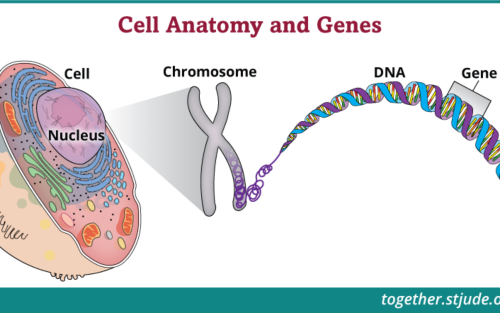Inherited Risk and Genetic Testing for Cancer
What is an inherited risk for cancer?
A person with an inherited risk for cancer has a higher likelihood of developing cancer due to gene changes that may be passed down (inherited) from their parents.
Genes are sections of DNA that carry important instructions that tell cells how to grow and function. Genes determine features such as hair and eye color.
A mutation is a change in a gene that affects how the gene works. Some mutations may make it more likely to get cancer. A person may be the first in the family to have the mutation. Or they may have inherited the gene change from 1 or both parents.
An inherited risk for cancer means a person has a greater chance of developing the disease. But it does not mean that the person will always develop cancer.
About 10–15% of children with cancer carry a gene change that is linked to an inherited risk for cancer.
Inherited risk may also be called a genetic predisposition. Learn more about genetic disorders and predisposition syndromes.
Genetic testing for cancer
Genetic testing looks for changes in a person’s genes that can cause cancer. Tests can show if a cancer is inherited. They may also show if family members have inherited the same mutation, even if they do not show signs of cancer.
There are many types of genetic tests. Your health care provider will talk to you about genetic testing and get your consent to do the tests. They will usually collect a small amount of blood, saliva (spit), or other tissue sample. Then they send the sample to a lab for testing.
Later, you will meet with your health care provider to discuss the test results and what they mean for you and your family.
When to seek genetic testing for cancer
Your care team might recommend genetic testing for your child if:
- Your child has a cancer type that may be linked to a genetic condition.
- Your child has body features or health problems that are related to a genetic condition.
- Family members have a genetic condition linked to certain cancers.
A genetic counselor can help you understand genetic conditions and prepare for genetic testing. Take time to carefully consider the pros and cons and discuss your concerns with your care team. Some people may feel sad, anxious, or angry about their test results. A genetic counselor can help you know what to expect and understand what results mean. They can also help you understand insurance coverage and find options for genetic testing.
Learn more about genetic counseling and testing.
Finding out about your family history of cancer
Learning about your family’s medical history can give important information about inherited risk for cancer. If possible, gather information about close relatives of your child. This includes parents, children, siblings, grandparents, aunts, uncles, and first cousins. Identify any family members who have or had any type of cancer.
For each family member who had cancer, try to find out:
- The specific type of cancer
- How old they were when it was diagnosed
- The part(s) of the body affected
- How it was treated
- Results of any genetic testing or medical records
You may not have access to family member’s medical history, and that’s OK. Some people may know a lot about their family’s medical history. Other people may not have much information available. Discuss any questions or concerns with your care team.
Living with an inherited risk for cancer
If your child has an inherited risk for cancer, there are steps to help manage and monitor their health:
- Have regular physical exams and testing to watch for health problems. Cancers and other diseases are easier to treat or cure if they are diagnosed early.
- Let all health care providers know about the results of genetic testing.
- Be sure to inform other family members so they can consider testing to see if they have the gene mutation.
- Talk to your care team about ways to lower your child’s risk of cancer.
- Practice healthy living habits to promote overall health and well-being:
- Meet with a genetic counselor who can advise you about your child’s risk for cancer. To find a genetic counselor in your area, talk to your care team or visit Personalized Care for Your Genetic Health from the National Society of Genetic Counselors.
Questions to ask about inherited risk and genetic testing for cancer
- What specific genetic conditions should my child be tested for?
- Will insurance cover the cost of genetic testing?
- What do the test results mean for my child’s cancer risk?
- What does this inherited risk mean for other family members?
- Should other family members get genetic testing too?
- What monitoring or screening does my child need?
- What counseling or support services are available?
Key points about inherited risk and genetic testing for cancer
- Some gene changes (mutations) can make your child more likely to get cancer.
- Talk with your care team about the benefits and risks of genetic testing.
- A genetic counselor can help you consider genetic testing and understand what family history and genetic test results mean for you and your family.
- Knowing about an inherited risk or genetic predisposition for cancer can help in planning your child’s care and treatment.




